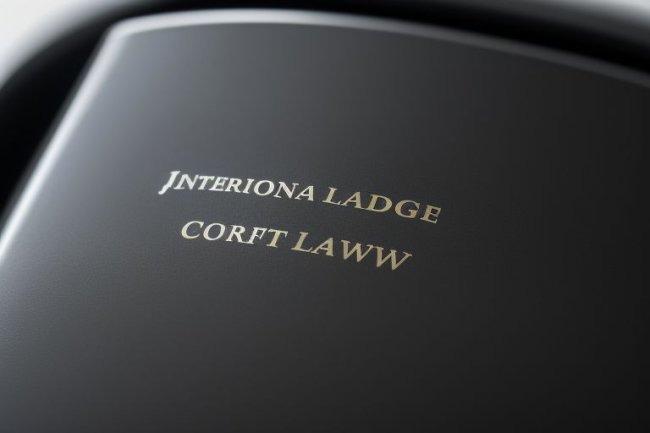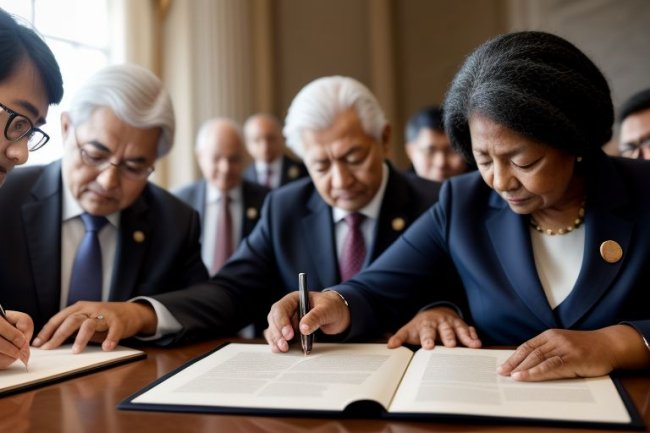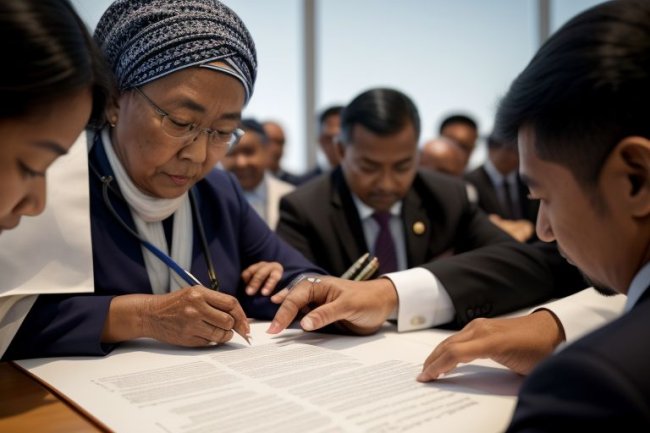Complementarity With Existing Legal Institutions
The necessity for strong and unified legal institutions has grown in importance with the constantly changing nature of international relations and global affairs. This idea is crucial for bolstering the international legal system and ensuring it operates properly. This theory is based on the notion that various legal bodies and procedures must collaborate in a coordinated manner, bridging gaps and supporting one another's initiatives.

At its core, complementarity seeks to enhance the efficacy of international law and justice by ensuring no legal vacuum exists and perpetrators of serious crimes are held accountable. This comprehensive approach acknowledges the diverse nature of challenges faced in the international arena and seeks to address them collectively through a harmonious collaboration among various legal institutions.
The Principle of Complementarity in International Law
The Rome Statute, which founded the International Criminal Court (ICC) in 1998, is where the complementarity concept first appeared. The International Criminal Court (ICC) is the first permanent international tribunal established to try people for the most heinous offenses, such as genocide, war crimes, crimes against humanity, and aggression. The ICC, however, only exercises jurisdiction when national legal systems are unable or unwilling to pursue such crimes, as it functions under the complementarity principle.
This principle serves as a fundamental pillar of the ICC's functioning, recognizing the primary role of domestic legal systems in addressing criminal offenses. By prioritizing national jurisdictions, the ICC aims to encourage states to strengthen their legal capacities and ensure accountability for serious crimes at the local level. Complementarity, therefore, emphasizes the role of domestic courts as the first line of defense against impunity, while the ICC serves as a backstop to ensure justice when national courts cannot fulfill their responsibilities.
The Role of Domestic Courts
Domestic courts are crucial in promoting the rule of law and upholding human rights within their respective jurisdictions. They possess the authority to prosecute individuals for crimes committed within their territory and are often best suited to address crimes that directly impact their citizens and communities.
Moreover, domestic courts have a deeper understanding of local customs, traditions, and nuances, which can enhance the quality and legitimacy of the justice they administer. This localized approach fosters greater trust among the affected population and ensures that justice is served and perceived as fair and equitable.
However, there are instances when national legal systems face challenges in prosecuting individuals responsible for serious international crimes. These challenges may stem from a lack of resources, political interference, or insufficient legal frameworks. In such cases, the principle of complementarity comes into play, allowing the ICC to step in and exercise jurisdiction.
The Role of the International Criminal Court
As a permanent international judicial body, the ICC operates based on complementarity and aims to serve as a court of last resort. The ICC's primary responsibility is to prosecute those most responsible for grave crimes when national jurisdictions are unable or unwilling to do so.
By exercising jurisdiction over cases involving serious international crimes, the ICC plays a crucial role in deterring future offenses, ensuring accountability for perpetrators, and providing redress for victims. The ICC's status as a global institution demonstrates the international community's commitment to eradicating impunity for the most heinous crimes and advancing the ideals of justice and humanity.
The ICC's complementary approach extends beyond its role as a prosecutorial body. It also emphasizes the importance of cooperation and collaboration between the Court and national legal systems. The ICC actively engages with states to facilitate investigations and trials, recognizing that effective prosecution often requires the support and involvement of national authorities.
Complementarity in the Context of Transitional Justice
Complementarity is not limited to the relationship between the ICC and domestic courts but extends to other transitional justice mechanisms. In post-conflict and transitional societies, pursuing justice and accountability often involves a range of measures, including truth commissions, reparations programs, and traditional justice mechanisms.
These approaches can be mutually reinforcing as they address different aspects of justice and reconciliation. Truth commissions, for example, can play a vital role in uncovering the truth about past atrocities, providing a basis for accountability and healing. Reparations programs, conversely, seek to address the harm caused to victims and communities by providing compensation and support for their rehabilitation.
In this context, complementarity ensures that different transitional justice mechanisms work harmoniously to achieve comprehensive and sustainable outcomes. By complementing each other's efforts, these mechanisms can contribute to the establishment of a durable peace, as well as the prevention of future conflicts.
Complementarity with existing legal institutions represents a powerful approach to strengthening the global legal framework and ensuring the effective functioning of international justice. The principle of complementarity, as embodied in the Rome Statute, underpins the functioning of the International Criminal Court and emphasizes the primary role of domestic courts in prosecuting serious international crimes.
By promoting collaboration and cooperation between the ICC and national legal systems, complementarity seeks to ensure that accountability for grave crimes is achieved in a manner that is both fair and effective. Additionally, complementarity extends to other transitional justice mechanisms, recognizing the value of a comprehensive and coordinated approach to post-conflict societies.
Fairness, Impartiality, And Transparency In The Court's Proceedings
A fundamental aspect of the International Peace Court's effectiveness lies in the principles of fairness, impartiality, and transparency that underpin its proceedings. The International Peace Court aims to create a just and equitable world where conflicts are resolved peacefully and diplomacy triumphs over hostility. By ensuring fairness, impartiality, and transparency in its proceedings, the court not only upholds the rule of law but also fosters an environment conducive to lasting peace.
Fairness in the Court's Proceedings
1. Equitable Access to Justice: The equitable access to justice principle is a cornerstone of the International Peace Court's commitment to fairness. This means that all parties involved in a dispute, regardless of their status or power, have an equal opportunity to present their case and defend their interests. By ensuring that each party is heard and their arguments are given due consideration, the court promotes a level playing field that enhances the legitimacy of its decisions.
2. Adherence to Due Process: Fairness in the court's proceedings is also maintained through strict adherence to due process. This includes giving the parties adequate notice, time to prepare their case, and the right to legal representation. By upholding due process, the court guarantees that decisions are based on the case's merits rather than procedural irregularities.
3. Impartiality of Judges: The selection of impartial and qualified judges is essential to maintaining fairness in the court's proceedings. Impartiality ensures that judges do not have any preconceived biases or affiliations that could compromise their ability to render unbiased decisions. The court's credibility and trustworthiness are bolstered when its judges demonstrate integrity and independence.
Impartiality in the Court's Proceedings
1. Objective Decision-Making:
Impartiality is at the core of the International Peace Court's approach to conflict resolution. Its judges are in charge of objectively evaluating the facts and legal defenses the parties make without taking a side. This commitment to impartiality enhances the court's ability to make fair and reasonable rulings.
2. Avoidance of Political Influence
To uphold impartiality, the court must remain insulated from political pressures or interference. It operates solely based on principles of international law and the pursuit of justice. Shielding the court from external influences ensures that its decisions are not swayed by geopolitical interests but are guided by a commitment to uphold the rule of law.
3. Inclusion of Diverse Perspectives
The International Peace Court strives to ensure the inclusion of diverse perspectives in its proceedings. This may involve appointing judges from different regions and legal traditions to bring a range of insights to the table. Embracing diversity fosters a more comprehensive understanding of complex international disputes and enhances the court's impartiality.
Transparency in the Court's Proceedings
1. Public Access to Information: Transparency is critical to the court's proceedings. Making relevant information accessible to the public, subject to necessary safeguards enhances accountability and trust. Public access to information allows interested parties and stakeholders to follow the proceedings and understand the basis for the court's decisions.
2. Open Hearings: The International Peace Court seeks to conduct open hearings whenever possible to promote transparency. Open hearings allow the public to observe the presentation of evidence and legal arguments, providing insight into the court's decision-making process. However, the court may also hold closed hearings in exceptional circumstances to protect sensitive information or the safety of witnesses.
3. Publicly Accessible Decisions: After reaching a decision, the court issues publicly accessible judgments that outline the reasoning behind its conclusions. These judgments serve as essential documents for scholars, practitioners, and the public to understand the legal principles applied and the court's interpretation of international law.
In pursuing lasting peace and preventing war, the International Peace Court is vital in ensuring fairness, impartiality, and transparency in its proceedings. The court promotes fairness by providing equitable access to justice, upholding due process, and selecting impartial judges. The court upholds impartiality by remaining objective, avoiding political influence, and embracing diverse perspectives. And through public access to information, open hearings, and publicly accessible decisions, the court promotes transparency.
These principles are not mere formalities but the bedrock of just and peaceful world order. By embodying these values, the International Peace Court inspires confidence, fosters trust, and encourages compliance with its decisions. The court's commitment to fairness, impartiality, and transparency is a testament to its dedication to upholding the rule of law and promoting global harmony. As conflicts continue to arise in an increasingly interconnected world, the International Peace Court stands as a powerful force for justice, accountability, and, ultimately, the prevention of war.




















